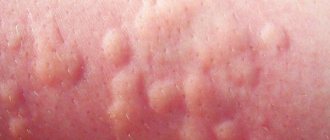Headaches bother every third woman during pregnancy and this is not surprising. The body is being rebuilt and undergoing serious hormonal changes. The amount of progesterone in the blood increases rapidly, inevitably leading to illness at 12-18 weeks; headaches sometimes become simply unbearable. Women, of course, experience difficulties, mood swings, migraine attacks, hypertension against the backdrop of surges in blood pressure.
In fact, there are reasons for the appearance of headaches, but taking most medications is unacceptable and you need to somehow learn to cope with the disease in other ways.
At 10-12, 13, the cause of pain is often toxicosis, which only promotes spasms of the blood vessels in the head, often accompanied by nausea and vomiting. Usually the pain is localized to one or another part of the head, but can be vague, appear suddenly, pulsate and spread over the entire surface. These are quite acceptable symptoms for women in this position at 12-13 weeks. However, sometimes they can be serious and can harm the baby.
If the headaches at 10, 12, 13-17, 18 are strong and incessant, stars appear in the eyes, blurred vision, vomiting, severe swelling of the face, pain in the hypochondrium, then of course you should see a doctor and undergo the proposed examination. These are quite dangerous signals that cannot be ignored during pregnancy.
Causes in the first trimester
It is at the beginning of pregnancy at 7, 10, 12, 13 weeks that the fetus is formed. The abdomen is still growing slightly, but blood flow and the reproduction of progesterone, which promotes the development and formation of the fetus, increase. It is its activity that provokes a change in the blood supply system to the fetus, so a state of oxygen starvation may occur due to the release of almost ½ of all consumed gases to the baby.
In the first trimester, the cause of headaches and discomfort, of course, is primarily hormonal changes, as well as surges in blood pressure, toxicosis at the initial stage of pregnancy. If you are prone to hypertension, your blood pressure may increase, which can lead to severe swelling and the appearance of protein in the urine. These are signs of the development of a serious pathology. Therefore, even with minor such manifestations, it is worth consulting a doctor.
Hunger can lead to pain at 10-12, 13 weeks, so it is recommended that expectant mothers eat less, but more often. The causes of pain are often:
- psycho-emotional instability;
- physical irritants: noises, strong odors;
- changing body position or staying in an uncomfortable position for a long time;
- irritating receptors;
- temperature changes;
- changes in intestinal microflora that can lead to bloating;
- swelling of the mammary glands, which often leads to irritability and nervousness in young mothers, and as a result, to pain in the head.
These are normal signs that a woman has to experience at 10, 12 and 13. In addition, the absence of regular menstruation and ovulation, and the intake of certain prohibited foods (chocolate, nuts, citrus fruits) can lead to unpleasant symptoms. At 10-12, 13, a restructuring of all systems and organs occurs, in particular in the brain. Nerve impulses react violently by releasing pain in the forehead, temples, and back of the head.
Women are recommended:
- applying cold or warm compresses to the forehead;
- taking a contrast shower that can narrow blood vessels, thereby eliminating pain;
- soothing, relaxing massage;
- walking in the fresh air.
At 7-10 weeks of pregnancy, the cause of headaches may be the gas pollution of large cities or staying in a stuffy, enclosed room. 12, 13 weeks are usually characterized by toxicosis, which passes over time, but other unpleasant symptoms appear: pain in the head, abdomen, aching joints. Many women begin to complain of unusual manifestations of fractures in the area of the crown and back of the head in the first trimester at 7, 10-12, 13.
Types of headaches during pregnancy
Headaches can be roughly divided into two main types.
The first includes pain caused by the disease, and the second type of migraine manifests itself as a result of mental stress, eye strain, and sleep disturbances. Pain in the mother’s head itself cannot harm the future toddler, but the reasons that cause it can negatively affect not only the woman. For example, an expectant mother suffers from headaches caused by hypertension, that is, high blood pressure; the danger of the disease is not in the pain impulse itself, but in the reason that caused it. After all, it could be a kidney disease, and without a medical examination and the necessary treatment, the result is very unpredictable.
Therefore, if you are periodically tormented by pain, do not delay your visit to specialists; timely assistance is the key to the health of your unborn child.
Overstrain of the back muscles, cervical region and salt deposits can also manifest themselves in headaches. In this case, massage and light exercise will help a lot, unless, of course, there are contraindications. A great way to relieve muscle tension and prepare your lower back for childbirth is to practice yoga for pregnant women.
If migraines do not occur often, you can try to overcome them on your own. First of all, a pregnant woman needs to establish a daily routine, get a good night's sleep and not neglect daytime sleep. Proper nutrition and a contrast shower have a great effect on the general condition of the expectant mother. You should not take medications right away; try drinking a cup of weak tea.
Causes in the second trimester
According to doctors, in the 2nd trimester, weeks 14-17, 18 are considered the calmest. The body has already sufficiently adapted to the restructuring of hormones, and the fetus begins to grow rapidly in size.
Headaches during pregnancy 14,15,16,17,18 can be caused by:
- physical or emotional stress;
- inhalation of gases after a long stay in a car;
- lack of sleep;
- sudden changes in weather;
- poor diet, abuse of strong tea, coffee and chocolate.
Headaches at 17-18 can be caused by old head injuries, sharp fluctuations in atmospheric pressure. Weakness and dizziness are often present. In the second trimester, medications are contraindicated; only in case of severe and persistent pain, you can take a paracetamol tablet or no-shpa. To find out the causes of pain, you should consult a doctor. Sometimes, to eliminate the disease, it is enough to improve your diet, massage your scalp, apply a compress to your forehead and get a good night’s sleep.
Discussion of current topics
I'm 13 weeks pregnant. I don’t feel very well (weakness and body aches, headache, slight runny nose). What is this? The first signs of a cold or the usual state of a pregnant woman?
A slight runny nose, as you put it, could be due to overheating. Perhaps you are dressed too warmly and are in a hurry to get home from the store, then you start sweating and have watery nasal discharge, similar to a runny nose. A headache can also begin in a healthy person, for example, due to overexertion at work. The remaining symptoms occur in most pregnant women in the first trimester.
But the possibility of a cold cannot be ruled out. Therefore, if possible, stay in bed, drink more warm liquids (milk with honey, tea with lemon or warm cranberry juice). Soaking your feet, lying in a hot bath and putting mustard plasters on is not advisable!
For more serious cold symptoms (chills, body temperature above 37.9 ºC, or cough), contact your doctor immediately for treatment. You can bring down a high temperature yourself, even before visiting a doctor, with one paracetamol tablet.
Remember that the normal body temperature for a pregnant woman is between 37.2 ºС and 37.4 ºС!
13th week of pregnancy, how many months of pregnancy is this?
To make it easier for you to determine how much it is in normal weeks, subtract two weeks from the obstetric period. This will be the actual (usual) period of pregnancy or, as they also say, the period from conception.
For example, 13 obstetric weeks - 2 = 11 weeks from conception. That is, 13 obstetric weeks is 11 weeks from conception or 2 months and 3 weeks (11/4 = 2.75).
I'm 13 weeks pregnant. A week ago, brown discharge started, I didn’t pay attention to it, I thought it was normal. It’s just that my period usually started around this time, so I thought that my body was reacting this way out of habit. Then the daubing stopped. Now the bleeding has started. Do I need to go to the hospital or can I stop the bleeding at home? Will anti-bleeding medications harm the baby?
You need to go to the hospital urgently, otherwise you can’t. Without medical help, you risk not only losing your child, but also worsening your health conditions. Brown discharge and bleeding usually indicate a threat of miscarriage.
If pregnancy is important to you, then you need to react immediately after the first abnormal discharge from the genital tract. Don't expect everything to work out on its own! Do not self-medicate and do not look for reasons to put off going to the hospital! Doctors will definitely help you and will make every effort to ensure that you carry the child to term.
If the embryo cannot be saved, then you need to undergo an examination and complete cleaning of the uterus so that inflammation does not begin.
I can’t understand, they prescribed screening at 13 weeks of pregnancy. What weeks are these: obstetric or actual (i.e., from conception)?
In medicine, they only use the term “obstetric weeks of pregnancy,” so focus your entire pregnancy only on them. When the doctor says: “You will come at 13 weeks for a scheduled screening,” this means that you are expected at the antenatal clinic at 13 obstetric weeks of pregnancy.
The lower abdomen hurts, there is no bleeding. I'm 13 weeks pregnant. What to do?
Pain in the lower abdomen at any stage is an alarming sign. It is necessary to drink no-shpa and do an ultrasound to confirm that the embryo is not in danger. Anything can cause pain, and it doesn’t have to be feminine, so stay calm.
Third trimester, reasons
By about 31, 32 weeks of pregnancy, the baby’s development is almost complete, the sense of smell and touch are already well developed, and the maturation of the lungs is nearing completion. The 32nd most exposed area is the muscles and pelvic ligaments in women. They are preparing for the upcoming birth and are gradually weakening. Painful sensations can be caused by the accumulation of air in some areas, as well as overwork, which, of course, is typical in this position. It becomes difficult for a woman to move, and all the cells and structures of the brain have to work hard.
Closer to the 38th week of pregnancy, a woman begins to experience emotional experiences, but already associated with the upcoming birth. Waiting for a baby becomes an unbearable burden for many mothers; there is irritability and nervousness. Headache can manifest itself in any part of the body: it radiates to the back, lower back, pelvic area, and joints. The pelvic bones gradually begin to soften, preparing for childbirth. At week 40, pressure occurs on the fetus and the fundus of the uterus. Contractions and attacks of pain in all parts of the body are inevitable. All these are symptoms of approaching childbirth.
At 32-40 weeks, headaches become irregular, however, if they become constant, then in order to save the baby, the woman should consult a doctor.
Pain in the last weeks of pregnancy can be caused by hypertension, increased stress on the spine, compression of blood vessels in the back of the head, increased eye pressure from exposure to bright flashes of light, cervical osteochondrosis, and ENT diseases.
Headache due to sinusitis, often accompanied by lack of sleep, old injuries, changes in weather or atmospheric pressure.
In the last week of pregnancy, taking many medications (in particular analgin, ketarol) is prohibited. All that remains for women to do is to resort to non-drug methods of getting rid of headaches:
- providing massage, aromatherapy, manual therapy, yoga;
- taking a contrast shower;
- ventilation of the room;
- avoiding physical stress.
If you have a severe headache, you can anoint your temples with “star” ointment. If your blood pressure is low, you can take 1 tablet of Panadol. Analogs of aspirin and citramone are excluded: askofen (can lead to bleeding, blocking the arterial passage for the baby), baralgin, spazgan, spasmalgon (toxic drugs that can lead to disorders in the blood).
Only in the second trimester at 14, 15, 16, 17, 18 weeks, if you have a severe headache, you can only take a paracetamol tablet.
At 38-40 it is better not to self-medicate, seek help from a doctor.
Pregnancy 31-32 weeks, features of fetal development, woman’s sensations
Pregnancy is 31-32 weeks, which means childbirth is just around the corner. The baby in the mother’s tummy is growing, developing, gaining weight, already pushing and turning over, therefore, the woman experiences some discomfort and is constantly worried about her position and future birth. What do 31 and 32 weeks of wonderful female health bring with them, and what sensations do every expectant mother experience during this period?
Development of the baby in the womb at 31 weeks
Pregnancy at 31-32 weeks is a crucial moment in a woman’s life, because now the baby in the womb not only grows, but also begins to persistently kick, asking, so to speak, to be born. The baby's height in the thirty-first week reaches approximately 40-42 centimeters, while the baby's weight, as a rule, varies between 1500 - 1600 grams.
During this period, the baby’s brain also continues to actively develop. Now the nerve fibers are already in a special protective sheath, and therefore the fetus transmits all the necessary impulses much faster than before.
The most important thing at this time is that the baby in the womb is already capable of all kinds of learning. The baby’s pupils are already like those of an adult, and therefore the fetus reacts well to darkness and light.
At the same time, the baby begins to turn pink, and a small layer of adipose tissue is already deposited under his skin. At this time, the baby, although he is in the mother’s tummy, is already able to feel pain and respond to it.
If you press down on the tummy even a little harder, the baby will immediately react to this, for example, with a retaliatory blow. He will simply begin to move, shudder, feeling even the slightest pain.
At the 31st week of pregnancy, the baby can hear perfectly. He can already perceive the lullabies that mommy sings for him and her conversations with him.
Fetal development at 32 weeks
Pregnancy 31-32 weeks is the period when the baby begins to actively grow and push. We discussed the development of the fetus at the 31st week of life in the womb above, now about the changes in the womb that occur and are recorded by doctors at the thirty-second week.
At the 32nd week, the baby’s height reaches 43-44 centimeters, and his weight increases by 100-200 grams compared to the previous week, he becomes about 1.8 kilograms. At the same time, every day the baby only grows and grows, gains weight, and all his organs are already fully functioning.
Now the child is undergoing, so to speak, external changes. His skin is already brightening, acquiring the pink tint we are all familiar with.
At the same time, it smoothes out, the limbs become rounded, and plump cheeks appear. The baby fluff disappears from the body; during the indicated weeks of development, it begins to be replaced by thicker hairs, although the hairs still remain soft and very sparse.
At this stage of pregnancy, the baby’s bones become stronger, but his skull remains soft. At the 32nd week, the fetus is already changing its location in the tummy.
As a rule, it turns over with its head “towards the exit”.
Pregnancy 31-32 weeks, contractions and childbirth
Sometimes it happens that in the thirty-second week of an excellent situation, a woman may feel attacks and contractions. Childbirth during this period, as a rule, occurs unexpectedly, suddenly.
The probability of the birth of a healthy, beautiful baby in this case is very high if the woman consults a gynecologist (emergency doctors) in time. Meanwhile, there is also a risk that a child born at the 32nd week of pregnancy will have some abnormalities.
If a woman’s pregnancy of 31-32 weeks is accompanied by severe diarrhea and pain (sharp, frequent pain) in the lower abdomen, which seems to surround her, it is important to immediately call doctors #8212; ambulance team.
It is also important to consult a doctor when, at the specified period of gestation, a woman observes vaginal discharge that is unusual for the period of pregnancy. They are also, as a rule, an indicator of premature birth.
Feelings of women at 31-32 weeks of pregnancy
Prevention is the best medicine
Any medications are contraindicated for pregnant women; they can lead to serious consequences, primarily for the fetus. In addition, many remedies are not able to relieve unpleasant symptoms in diseases such as sinusitis, meningitis, and cerebral hematoma. However, headaches during pregnancy are common and quite normal. Women tend to be nervous, and hormonal imbalance leads to suspiciousness and tearfulness, especially at 12, 13, 17, 18. Some continue to work hard during pregnancy, spending long hours in a forced, often uncomfortable position. It is recommended to walk more and be in the fresh air, especially in the last 38-40 weeks before giving birth.
Adequate sleep means getting rid of even the most severe headaches and discomfort. The head often starts to hurt precisely because of lack of sleep or a long stay in a closed room. The disease can be triggered by a feeling of hunger, so women are recommended to eat smaller meals in small portions and include more fruits and vitamins in the diet.
If your blood pressure is low, you can drink black tea with sugar.
Several sessions of aromatherapy are effective. Essential oils have a calming effect on the nervous system and brain, helping to improve mood and overall well-being. A woman just needs to put a few drops of oil on her clothes. Massage helps to relax the muscles of the shoulder, neck, feet, joints, and head. It is enough to massage the bones with your fingertips, or apply a compress from a moistened cold towel.
Pregnant women need to learn to relax, remain calm, avoid overstrain and nervous breakdowns, avoid staying in a smoky, unventilated and stuffy room, adjust their diet and daily routine, get rid of noisy companies, and sound irritants from the radio or TV, avoid eating food with dyes and preservatives, satisfy the feeling of hunger in a timely manner, taking a little food with you during a long walk.
From the first weeks of pregnancy, many women begin to suffer from migraines due to hormonal changes. Although this is only an indirect sign and women who have not encountered it earlier, at 7-10 weeks, up to the 18th week, begin to experience similar manifestations. Closer to the second semester, the pain usually goes away, often returning at the end of the third, closer to childbirth.
The main cause of the disease is the body’s reaction to a surge of hormones, but it manifests itself differently in each woman. It is possible that the intake of certain foods, or allergic manifestations, toxicosis, and excess weight in women can help tone the blood vessels.
The pain is not dangerous; it is only a temporary phenomenon that can cause a lot of inconvenience. Along with them, there are often attacks of nausea and vomiting, visual disturbances, stomach upsets, ringing in the ears, increased irritability and fatigue.
Headache is a sign of pregnancy, but other causes should not be ruled out. This may be dehydration of the body, the development of internal diseases, in particular tumors in the brain. If a woman is not pregnant, then you should not delay visiting a doctor and undergoing a full examination.
Similar articles:
source: GolovaBoli.ru
» 13 weeks pregnant
How and what to treat severe headaches
There are medications for headaches during pregnancy and they are practically safe. But you shouldn’t see them as the last straw for salvation and take pills at any time to relieve irrepressible pain.
Moreover, they relieve the symptom itself, but the cause of the pain remains. Paracetamol has always been considered the safest drug; it can be taken at any time during pregnancy without exceeding the dose.
But it is better not to take combined tablets like Tempalgin. Because in addition to the main component, it may contain additives that will have a negative effect on the fetus.
To avoid swallowing pills, there are also natural methods of dealing with pain.
Hello, I’m 13 weeks pregnant, I got chickenpox,…
Hello, I’m 13 weeks pregnant, I got chickenpox, but I don’t have a fever. The rashes are mainly on the arms and legs. Tell me how dangerous this disease is for the fetus.
Other questions on the topic
Good afternoon. I have been diagnosed with Epstein-Barr and varicella zoster viruses. The test results are as follows: Epstein Barr V IgM - positive, value = 0.313 Epstein Barr V IgG - negative, value = 0.058 VZV IgM - positive. Indicator = 0.772 VZV IgG - positive indicator = 3.37 The infectious diseases doctor prescribed ISOPRINOSINE, course 7 days, 3 times a day. Please tell me what is needed for effective treatment? When can you plan a pregnancy?
My son (5 years old) contracted chickenpox in the garden. I am 29 years old, I didn’t have chickenpox as a child, and two days after the child was discharged, I discovered several watery pimples of different sizes on my body. On the second and third days, my whole body was covered with pimples. And on the fourth, many pimples turned into pustules. Tell me how to treat them and how dangerous it is.
My son fell ill with chickenpox, so naturally I went to the Internet to read what’s what. Everything about him is as bad as that of an ordinary chickenpox patient. This is just scary: I found two subcutaneous balls on his head and chest. On the head the diameter is approximately 0.5-0.8 cm and on the chest 1 - 1.5 cm. What kind of disgusting thing is this?
I'm pregnant (37 weeks). My 3-year-old daughter contracted chickenpox in kindergarten. I don't know if I had chickenpox as a child. What are the consequences of my infection with this virus for the fetus and is it possible to avoid these negative manifestations for the baby?
Hello, Sergei Mikhailovich. I will describe the course of the disease, below are questions. (-) 1st day (THU) Weakness, poor sleep. Studied. (-) 2nd day (PT) same symptoms. Redness appeared on the face, did not attach any importance. I anointed the pimple with alcohol. I studied, and by the evening I felt better. (+) 3rd day (SB) same symptoms + rash on the face (even about 5 quite large ones / one is generally about 1 cm /) and there is also a rash on the body, but it’s small, temperature 38-39. I called the doctor. (+) 4th day (SUN) same symptoms + rash appears further on all parts of the body, but.
My child is 8 years old. A few days before the signs of chickenpox appeared, he began to complain of a headache. And now, during chickenpox, I often have a headache. Is this pain caused by chickenpox and how to deal with it? I didn't have a headache before. Thank you.
Hello, Sergey Mikhailovich. I am 41 years old, the rash appeared on Monday, the next day the temperature rose to 38. The diagnosis is beyond doubt, a child just had chickenpox. This Sunday it is extremely important for me to go on a business trip. How contagious will I be to others? Are there ways to speed up recovery? Does it make sense to apply acyclovir to a rash, at least on the face?
I am 40 years old and I contracted chickenpox from my son. I've been sick for 10 days now. Some of the crusts have already fallen off, especially on the liuya, but underneath there are red spots. Please tell me what needs to be done to make them disappear. How long can they stay?
The crusts on my face have fallen off, and in their place there are small dimples. after some time they heal. This is fine? and I also have a deep dimple on my chin. will she heal too? Will I have any scars? How can I deal with dimples?
Hello! I have had chickenpox for 11 days now since the pimples appeared. When can I swim? Can my boyfriend get infected if 11 days have already passed and he has no signs. Can he infect others after communicating with me? How long will I be under quarantine if there are a few crusts left on my body?
Dear doctor! On Saturday evening I was drowsy, the first 2 pimples appeared on my face, I realized that it was chickenpox (because my sister was sick and it was impossible not to get infected). I am 13 years old. On Monday there were rashes on the face, on Tuesday on the stomach and back, and on Wednesday the last rashes on the legs. I've had dry blisters on my face for 3 days now. But on the large dried bubbles at the ends I have darkened, on my stomach there are a few such blackened spots at the end, but the rest of the bubbles were there before.
Hello. I am 26 years old. My child suffers from chickenpox, I am with him all the time. My mother says that I had chickenpox at the age of 4, but in a very mild form, and she did not get sick at all (neither in childhood nor with me). I had radiation therapy half a year ago, i.e. There are certain problems with the immune system. Questions: -What is my chance of getting sick (again with chickenpox or shingles)? -Can my mother get sick (I talked to the child 1.5 days before the rash appeared)? -Does it make sense to donate blood to me for antibodies?
The situation is this: the girl I am looking after has a friend who has chickenpox. Lisa (my girl) came into contact with her the day before her skin rash. this was 2 weeks ago. This morning Lisa developed a rash. I didn’t seem to have chickenpox as a child (I’m 25 years old). a week ago I felt signs of a cold - a slight headache, a sore throat, and a slight fever. 2 pimples popped up on my left leg and one on my right wrist, but it went away almost immediately on its own. remains only.
There are about 40 people working in the office, one went on sick leave with a diagnosis of chickenpox, and a couple of weeks later another with the same diagnosis. How to protect yourself from this disease if you have never been sick before. Are there any vaccinations against this disease?
My great-grandfather suffers from chickenpox (83 years old). My grandmother, who had chickenpox as a child, came into contact with him. I am wondering if my grandmother could be a carrier of the infection? Isn't it dangerous for her to communicate with her grandchildren who have not had chickenpox? thanks in advance
Sources: No comments yet! source: beremennost40nedel.ru
Welcome, dear mothers, to the thirteenth week of your interesting situation. There is no time to relax: here you will find your own difficulties and little joys. The baby inside you becomes a full-fledged person, and you only remember about toxicosis in nightmares.
Cold during pregnancy 13 weeks
Answers:
Tanichka Tanichka
you should drink less)))
VICIOUS
to the doctor! do not self-medicate
Nemez
As they say, if a cold is treated, it goes away in 7 days, and if left untreated, it goes away in a week. 
Old lady over 40
INSTI herbal tea for colds. Helped me
Squirrel
Try to drink more fluids, with cranberries, lemon and pastel mode. Gripferon can be instilled into the nose if the nasopharynx is inflamed, and you can spray cameton and chew ginger root. I was also sick, but I was treated with simple remedies, unless of course it reached a high temperature. but my friend was still treated with antibiotics (sore throat). Thank God everything turned out okay. son is 20 years old)
Yu.I.
Drink more... Tea with raspberries and lemon...
Ya@ru
folk remedies seem harmless to me... steam the legs a little (just a little), do inhalation, rub it, make a compress on the neck, hot tea or milk at night. I was treated like this, I tried not to take medicine
_-=uLcEr=-_
tea with lemon, if you have a runny nose, then at the pharmacy you asked the pharmacist for drops that can be taken by pregnant women, raspberry jam, a little honey or lingonberry compote, and under the blanket and bayushki, but it’s better to call a doctor
Katyushechka
Drink more fluids, if the temperature persists for 2-3 days, go to the doctor. Get well!
Deer
Don't worry! Be careful with ginger, it can cause uterine contractions. Tea with honey and lemon, drinking more and pastel mode. I also had it at 11 weeks, nothing bad happened!
Anna
You can't take practically anything. Bed rest is required. Drinking plenty of fluids reduces the temperature. I brewed rosehip in a thermos (my mother-in-law recommended it) - it really helped a lot. Honey and lemon have not been canceled either. I was very surprised by the effect of Grippferon - now I buy it all the time. For the throat, you can apply topical sprays (there are no direct contraindications, for example, Tantum Verde), but do not overuse, Strepsils lozenges - also without fanaticism. You also need good emotions - killer comedies, lying in bed - that's it))). Get well.
Baby development at 13 weeks of pregnancy
1. Skeleton
The figure finally becomes more proportional, as the size of the head compared to the body gradually returns to normal. The bones of the skull are the most formed during this period. Our hero already has a whole pair of ribs. Signs of his individuality—prints—appeared on his tiny fingers.
2. Head
The brain never stops improving and actively developing for a minute. Our baby can now safely be called a toothy one, because all his teeth are now formed and will now look forward to the moment when they need to erupt.
3. Internal organs
The pancreas is capable of producing insulin, and the liver is capable of producing bile. Girls already have eggs, and boys have a prostate gland. The heart works actively and is capable of pumping more than 23 liters of blood per day.
4. General indicators
Our wonderful baby continues to grow, reaching 8 centimeters in height and almost 20 grams in weight. Now the baby will grow in height and gain weight just before birth. His movements become less chaotic, he even begins to suck his finger. Lanugo appears - this is the name of the first fluff on the body and head of the child, which will later become hair.
5. Placenta
Finally, the placenta completes its formation. Now she takes full responsibility for the outflow of waste products, feeding the child and supplying him with oxygen. In addition, it is already capable of producing progesterone and estriol.
Photo ultrasound
At 13 weeks pregnant you feel amazing. During this period, you are curious about how your baby is developing and what changes are happening in your body. And maybe you have already started a diary to record all the new sensations every day. After all, it will be so nice later, leafing through it, to remember your pregnancy and read it to your baby.
Action plan for the 13th week of pregnancy
First, you will need to somehow facilitate your digestion process. How to do it?
- increase in your diet foods that have a laxative effect: grated beets, seaweed, wheat bran, prune or dried apricot decoction;
- do not get carried away with products that have a fixing effect: pears, bird cherry, poppy seeds;
- Move actively: walk, visit the pool and do simple physical exercises. Read more in the article: water aerobics for pregnant women.
The second goal is to reduce headaches. It is important to remember here that medications are excluded from your first aid kit. What to do then if your head starts to split from pain:
- first, lie down and provide yourself with complete peace and quiet;
- ventilate the room if possible;
- apply a cool compress to your temples;
- you can drink a weak decoction of lemon balm or chamomile;
- It’s better not to drink mint, but you can put a sprig of it next to you on the pillow;
- you can allow yourself to fall asleep.
Do not forget about regular prevention of stretch marks, which will ruin your mood after childbirth. For this:
- carefully monitor your weight gain, avoiding extra pounds;
- take a contrast shower;
- get a massage.
This week you and your husband will be able to sign up for specially organized courses to prepare for childbirth. On which, among other things, you will learn about the symptoms of childbirth and how to prepare for them.
Colds at 14 weeks of pregnancy consequences
1. Guest |
02/11, 12:39:35 [436801628] Sore throat and runny nose for two days, this morning the temperature was 37. Pregnancy 14 weeks. I rinse with iodine and propolis, drink tea with lemon, honey and raspberries, drip pinosol from the very initial symptoms. and it only gets better worse. The doctor prescribed half of the medications that are contraindicated for pregnant women. How were you treated and what can be done at this stage?
I was sick in exactly the same way at the same time. I was treated only with my grandmother’s methods. It was all over in three days. I gargled with chamomile every hour, rinsed my nose with salt water or aquamaris, as you like, also every hour. I drank raspberries, milk with chalk and butter, and tea with lemon. That's all the treatment. Then I finished off my throat with lysobacter, which can be used during pregnancy.
2. Guest | 11.02, 12:40:17 [436801628]
I was sick in exactly the same way at the same time. I was treated only with my grandmother’s methods. It was all over in three days. I gargled with chamomile every hour, rinsed my nose with salt water or aquamaris, as you like, also every hour. I drank raspberries, milk with chalk and butter, and tea with lemon. That's all the treatment. Then I finished off my throat with lysobacter, which can be used during pregnancy.
Milk with honey, there was a typo.
3. Guest | 11.02, 12:45:26 [3079618715]
What do you mean contraindicated? Depends on what. Moreover, you have started your 2nd trimester. Some are really not allowed, and on some, although it is formally written that it is contraindicated, in reality quite often doctors prescribe, they are treated and healthy children are born, and it is written so simply because the instructions have not been rewritten for a long time since the old days, and then they could not say for sure.
So you would write which drugs exactly. Sanorin, which is formally prohibited, is one thing, but in fact pregnant women at any stage can be dripped into the nose in SMALL quantities, and many antibiotics are another thing (only a few are allowed for pregnant women, and then usually starting from the 2nd trimester, and in the 1st trimester only if it comes about saving the mother's life when it is more important to cure her, even if through a potential termination of pregnancy).
Paracetamol is okay, but all the Teraflu-anti-grippins-Fervex stuff is better not needed. And what can be done in a traditional way - gargle with soda, chamomile, furatsilin (it is not contraindicated), if you have a fever - a paracetamol tablet, tea with honey and raspberries, and of course, lie down, everything is correct. Throat sprays - formally some are possible without problems, for example Tantum Verde - definitely possible, some are written not to be used, but in reality - these topical agents do not penetrate the bloodstream, so usually it is possible without abuse. The same as throat lozenges.
4. Guest | 11.02, 12:50:35 [3878105372]
I was sick with the flu for this period of time and brought down my temperature with Fervex. Because she was very tall. The baby is fine
5. Maria | 11.02, 12:55:13 [2993950726]
You can do inhalations with essential oils, tantum Verde, lysobact, laripront (all for the throat). for the nose - aqua maris, pinosol. I myself was prescribed Bioparox for coughs and colds, although this is an antibiotic and it was possible before, but now the instructions say with caution. I didn't take it.
6. Guest | 11.02, 12:55:19 [3545557829]
When I was pregnant, I was also terribly sick twice, but I was afraid to take any medicine at all. I treated it with folk remedies, more fluids.
Visit to the doctor at thirteen weeks of pregnancy
This week, your visit to the supervising doctor will not be a discovery for you in terms of new procedures or additional mandatory tests. The first examination of your pregnancy is over, so at this stage the doctor can only advise on the issues that worry you (constipation does not go away, severe headaches torment you). And if for some reason you weren’t scheduled for an ultrasound last week, it’s time to finally see your baby for the first time.
This is how the thirteenth week of your pregnancy will proceed, dear mothers. Take care of yourself, listen sensitively to what is happening inside you, and everything will go strictly according to plan.
source: www.vse-pro-detey.ru
Colds in the 2nd trimester of pregnancy
Any cold during the 15th week of pregnancy puts the fetal endocrine system at risk. There is a possibility that the child may be born with endocrine pathologies (for example, diabetes). In addition, there is a risk of premature termination of pregnancy. The risk of complications in this case will be directly proportional to the severity of the disease.
If the birth of a girl is expected, then a cold at the 19th week of pregnancy can provoke disturbances in the formation of the egg. A cold at 24 weeks of pregnancy can have undesirable consequences for the child’s nervous system. During this period, the formation of the subcutaneous fat layer also occurs and the formation of parts of the brain is completed.
Acute respiratory viral infections are caused by pneumotropic viruses. In diseases of this kind, the respiratory organs are mainly affected. In addition to classic respiratory infections, such diseases include influenza and adenoviral infections. The main danger of this type of disease lies in the possibility of a bacterial infection, which is fraught with various complications (for example, pneumonia). We discussed the most dangerous complications for expectant mothers a little higher. Symptoms of acute respiratory diseases:
- Weakness, deterioration of psycho-emotional state, increased fatigue, decreased performance
- Headache
- Chills, aching sensation in bones and joints
- Increased body temperature
- Feeling of nasal congestion and other symptoms of runny nose
- Hyperemia of the mucous membrane of the throat, painful sensations that increase when swallowing
- Cough
The temperature may not rise for some time, which is advisable to use as effectively as possible to treat the symptoms of the prodromal period. Simply put, if a woman coughs, sneezes and generally feels somehow uncomfortable, it is not at all necessary to wait for the appearance of fever and chills to make sure that ARVI actually occurs.
We should not forget that the health of an unborn child can be affected not only by colds, but also by improper use of pharmacological medications. During pregnancy, a woman should coordinate the use of any medications with her doctor, avoiding self-medication. Many seemingly harmless drugs can cross the placental barrier and have extremely undesirable toxic effects on the fetus. Here are some groups of medications that a woman should avoid during pregnancy:
- Antihistamines. The use of diphenhydramine is especially undesirable, since it has a negative effect on the development of the gastrointestinal tract in a child. In addition, cases of convulsive conditions in the fetus have been reported when using this drug.
- Bronchodilators used in the treatment of respiratory diseases can also have an adverse effect on the gastrointestinal tract of a child developing in the womb. The most famous and frequently used drug in domestic medical practice is aminophylline.
- Barbiturates. The most popular brand among pharmacological drugs in this group is phenobarbital, known since Soviet times. It has a pronounced sedative effect and is often used in the treatment of epilepsy. Its negative effect on the fetus is damage to the liver tissue, as well as the central nervous system.
- Antibiotics. For the treatment of colds, drugs in this group are not effective because they do not have an effective effect on viruses. In a child, the use of antibiotics during pregnancy can provoke the development of anemic conditions, which is fraught with hypoxia due to disruption of the transport of oxygen by red blood cells to various organs and tissues. It is better to simply forget about drugs such as tetracycline, griseofulvin, chloramphenicol before birth. In addition, the use of antibiotics in the mother is highly likely to cause dysbiosis, even with the parallel use of drugs that improve the condition of the intestinal microflora. Needless to say, such complications will be completely inappropriate?
- Sulfonamide drugs can adversely affect the development of certain parts of the child’s brain. The expectant mother is strongly advised to avoid drugs such as biseptol, sulfasalazine and sulfadimethoxine.
- Hormonal medications, with rare exceptions, are strictly contraindicated for pregnant women. Their use not only negatively affects the development of the child, but is also highly likely to cause spontaneous abortion. One of the few exceptions in this regard are progesterone preparations, which help maintain pregnancy when a woman’s hormonal balance is disturbed.
It is immediately necessary to make a reservation that this is only a small part of the most commonly used pharmacological agents. Almost any medication, in addition to its therapeutic effect, has a number of side effects, so a woman must always coordinate the use of any medication with her doctor.
First of all, a woman should remain in bed, even if the symptoms seem harmless. The appearance of a slight runny nose and cough is a serious reason to start treatment at home. Having a cold on your feet is harmful for everyone, and especially for pregnant women, since their immunity is weakened. Let's talk briefly about why this happens.
The human body's immune system is designed to destroy any foreign proteins. In everyday life, we are surrounded by an incredible variety of bacteria. If our body did not have the ability to destroy them when they entered the blood, we would have only two options: either live in sterile conditions (even for food we would have to go in a rubber suit and a respirator), or die in the prime of life from the most minor infections.
Unfortunately, immunoglobulins tend to perceive the fetus growing in the womb as an unfamiliar foreign body. To prevent the pregnancy from being terminated prematurely due to the excessive activity of antibodies, the body is forced to weaken their activity. As a result, immunoglobulins leave the fetus alone, but they also react extremely reluctantly to very real infections.
That is why a pregnant woman, even with a mild cold, has every chance of aggravating the course of the disease with new infections, which will certainly take advantage of the forced limitation of antibody activity in the blood. Namely, on the street and in crowded places, the risk of contracting a concomitant infection increases many times over.
When the temperature rises to 38 degrees, taking aspirin is contraindicated! It can be replaced with paracetamol drugs. When a cough appears, there is no question of the fashionable tablets that are advertised at every turn, since most of them contain codeine, which depresses respiratory function. A cold during pregnancy in the 2nd trimester is a risk factor in this regard, so it is necessary to limit yourself to inhalations with essential oils.
For sore throat, gargling with decoctions of calendula, eucalyptus or chamomile every 30-40 minutes is recommended. You can make a saline solution: add half a teaspoon of salt and one teaspoon of soda to one cup of slightly warm water. Of course, to strengthen the body’s defenses, a woman needs to take vitamins C and eat more onions, which, due to their phytocidal properties, improve resistance to any cold.
Every woman who gets sick during pregnancy always worries about how her illness will affect the child. This is natural, because taking care of the health of your baby is the most important task for parents. At different stages of pregnancy, colds affect the baby and mother differently. Let's consider what a cold can mean during pregnancy in the second trimester.
The second trimester of pregnancy lasts from 12 to 24 weeks after conception. During this period, you can breathe a sigh of relief, since viral infections can no longer cause such a strong blow to the baby’s health as in the first trimester. The fact is that the fetus is already protected by the placenta, which serves as a conductor of nutrients, oxygen, and is a kind of barrier from the negative influences of the outside world.
But a cold can attack this shield. Feto-placental insufficiency occurs, in which the transfer of nutrients and oxygen to the fetus is difficult. The baby may be born prematurely, weighing below normal. In the second trimester, the baby’s nervous system may suffer, since during this period it is actively developing.
If you get a cold at week 14, there is a possibility of miscarriage or changes in the endocrine system. If this happens at 16-17 weeks, the fetus may not develop bone tissue properly. When a woman is expecting a girl, special attention to her health needs to be paid during the period of 19-20 weeks. At this time, the formation of eggs occurs, and the virus can disrupt the correct process, which will lead to infertility in future women.










